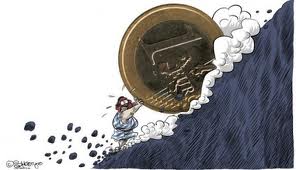By George Serafeim**
News about the Greek economy continues on the front page of every major newspaper, as the country continues its six-year struggle to reenergize its economy. On Friday, Eurozone finance ministers will decide whether to release emergency funds to Greece, and the country must make two repayments totaling 950 million euros to the International Monetary Fund by May 12.
However, major confusion exists about what has happened in this period and why we are still talking about Greece being at the Eurozone’s exit door and at the brink of bankruptcy.
Greek politicians are blaming, first, one another based on the party affiliation, and second, their European creditors for imposing harsh austerity measures. The Europeans counter that the Greeks are failing because they have not implemented reforms proposed to them by creditor nations.
My belief is that there is plenty of blame to go around, but there is still a way for Greece to recover to the betterment of the entire European community.
The Successes
Let’s start by reviewing the successes in the past few years (yes there are some). It is true that Greece reformed laws and regulations to make its economy more open to foreign trade and as a result more competitive. Trade (defined as the sum of exports and imports) to GDP ratio stood at 63% in 2014, the highest in the last 20 years. More importantly, these gains were driven entirely by increases in exports, which as a percentage of GDP rose to 30%, much higher than the typical 20% that was the norm 10 years ago. Merchandise exports rose between 2007 and 2014 by more than $15 billion, according to World Bank. Also on the plus side of the ledger, tariff rates declined, leading to more competition and forcing Greek companies to compete internationally.
A visitor, using a selfie stick, takes a photo with the Parthenon temple in the background on Acropolis Hill in Athens, Greece, on Saturday, April 18, 2015. Greece’s government bonds had their worst week since the aftermath of Syrizas January election victory as the nation failed to make tangible headway in its efforts to secure funding and avoid a default. Photographer: Kostas Tsironis/Bloomberg via Getty Images
Reducing bureaucracy also helped: time to export decreased from 20 to 16 days, according to the World Bank. The increase in exports was driven primarily by industrial goods rather than agriculture or services. Industrial exports increased as a percentage of total exports from circa 25% to 40% between 2007 and 2013. It is no coincidence that the largest increase in labor productivity over the last few years has been observed in industrial firms-partly thanks to changes in labor regulations that made labor markets more flexible.
Reforms were also effective at cutting red tape that prevented entrepreneurs from starting businesses. The number of days to start a business declined from a staggering 38 in 2007 to 13 in 2014 with the number of procedures to start a business declining from 15 to 5. Equally good news was that the average time to prepare and pay taxes declined from 264 to 193 hours over the same period.
The Failures
This is all good news and, in theory, should have helped large Greek companies and startups compete more effectively. But that hasn’t happened. Why? To a large extent it is because of the inability of firms to obtain financing. All sources of financing collapsed in the country. With bank nonperforming loans to total gross loans skyrocketing from 5% to 33% from 2007 to 2014, financial institutions were unable to provide new loans to underwrite company growth.
Even large companies that could ordinarily rely on public equity or debt markets discovered that both were effectively shut down. Cost of capital for both equity and fixed income claims increased significantly because of country risk premium. In the 2014 World Competitiveness Yearbook Ranking, conducted by the International Institute for Management Development (IMD), Greek business managers answered a survey question about whether “cost of capital encourages business development.” They gave a ranking of close to 6 before the crisis and 1.3 in 2014. To make things worse, credit rating agencies imposed filters that automatically downgraded ratings of Greek corporations when Greek government bonds were downgraded, as the recent case of industrial firm Ellaktor and Standard and Poor’s shows. With the venture capital industry being underdeveloped, Greek entrepreneurs were also excluded from financing. (See here my view on increasing innovation capacity in Greece.)But even while the dour financing picture limited the ability of Greek companies to simulate growth in the economy, another mechanism to do this could have been foreign direct investment (FDI). Again, the news was not good, with no positive trends shown. Only the Greek government is to blame for this fiasco. While many factors can contribute to the inability to attract FDI, I believe two of them were the primary determinants:
1. Political uncertainty. Lacking strategy and vision the country has floated with no sense of direction. Policies change constantly. To make things worse, the polyphony increased over time as new ministers made contradicting statements around privatizations, further confusing foreign investors. Survey data from the same IMD competitiveness report are striking. Asked to rate Greece on the statement “risk of political instability is very low,” the score declined from 8.52 in 2007 to 3.35 in 2014.
2. Degradation of property rights. Protection of property rights in the country is still poor and a major deterrent to investment. Greece scores just a 3 out of 12 on a World Bank’s strength-of-legal-rights index, actually decreasing from 4 in 2007. Tellingly, the time required to enforce a contract in courts has increased from 819 days in 2007 to 1,580 days in 2014.
Who Is To Blame?
Loud voices, such as that of the current Finance Minister Yanis Varoufakis, have argued that the inability of Greece to recover is because of recessionary measures imposed by creditors. While recessionary measures in the midst of a severe recession are not part of an optimal economic policy, this view is deeply naïve because it ignores the political realities of Greece.
The track record of Greek politicians is one of populism, corruption and fiscal irresponsibility. (See here for my thoughts on the ability of Greek government to implement reforms.) Why would we expect the people that exhibited such behavior in the past to now change their actions? Allowing the Greek government to spend more money would leave the country with more debt, eventually. In the same competitiveness report Greeks give a score to their government of 2 out of 10 on whether “Public finances are being efficiently managed.” Indicatively, although the Greek government increased taxes across the board both collected indirect tax revenues and collected social security contributions as a percentage of GDP failed to increase (they stand at about 12% and 10% of GDP, respectively). Limiting the evasion of taxes and social security contributions still represents a dream.
In a country with well-developed institutions and a well-managed government, creditors would be more likely to relax the conditions of fiscal assistance, since they would trust the government to do the right thing. Distrust, such as exists between Greece and its creditors, brings harsh measures and a tight leash. This is well established in the literature and is related to building “relational contracts,” informal contracts that are not enforced in courts but that require that the counterparts in the transaction expect each other to perform their responsibility even in the absence of legal enforcement.
In summary, the recessionary measures that were taken in Greece were not the cause of the crisis. They probably contributed to sharp declines in GDP and increases in unemployment, but such measures are needed when lending money to a government with a very poor track record in managing the government budget for the prosperity of its citizens.
Nor are those measures the cause of the inability of Greece to recover. As I described above, reforms that could help generate growth include relaxing financing constraints for both large and startup Greek companies and by attracting FDI by reducing political uncertainty and strengthening property rights.
So Greece must first help itself. But it is in everyone’s interests for the European Union and the IMF to help Greek companies obtain financing. They have the mechanisms to do so—the European Bank for Reconstruction and Development could be used as a vehicle to provide financing directly to Greek companies. These organizations should also help the Greek government reform protection of property rights and especially the efficient functioning of the courts. Greece has excellent human capital, as evidenced by the supply of qualified engineers and the availability of skilled labor. It lacks the institutions and the governance system that fuels growth.
But European allies cannot reduce political uncertainty. This is left to the Greek government and ultimately to the Greek voters.
**George Serafeim is the Jakurski Family Associate Professor of Business Administration in the Accounting and Management unit at Harvard Business School.



















